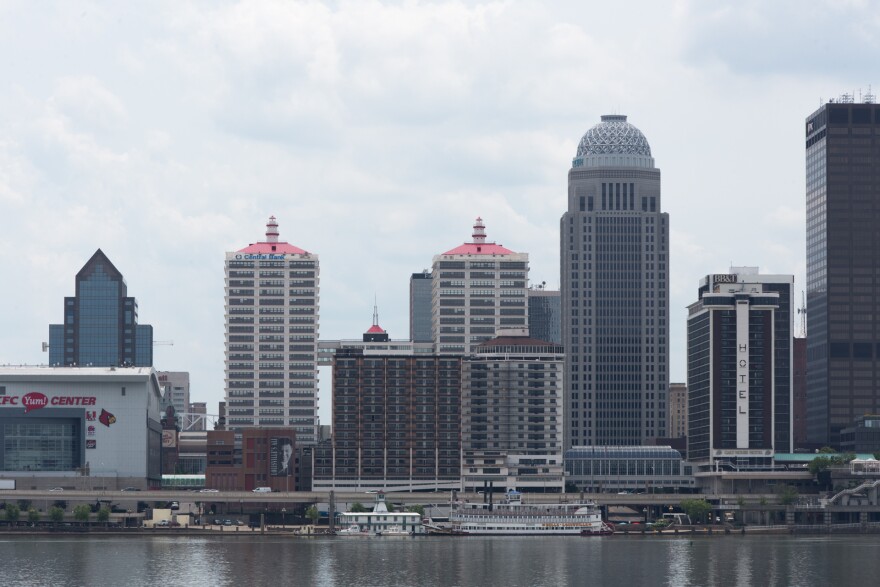The Metropolitan Housing Coalition has more than 300 members, including affordable housing developers, financial institutions and local nonprofits. Their annual “State of Housing” reports share data on everything from evictions in Jefferson County to rising rents and building permits.
Tony Curtis, the coalition’s executive director, said one of the reasons they chose to focus this year on the connections between climate change and housing to combat the misconception that the climate crisis is “happening there, not here.”
“It’s the same thing with affordable housing in our community: It shouldn’t be built here, it should be built over there,” Curtis said. “The reality is that these two topics — housing crisis, climate crisis — are inextricably connected.”
Curtis said climate change, like the affordable housing crisis, is an issue that local elected officials have to address.
The planet’s top scientists have warned for decades that the world’s climate is getting warmer because of the burning of fossil fuels. That’s leading to an increase in severe weather events.
Kentucky is no exception to this. Climate change is causing the state to become warmer and wetter. Experts say the historic flooding eastern Kentucky experienced last July is an example of the severe weather that will become more frequent in the coming decades.
In its report, the Metropolitan Housing Coalition pointed to a number of ways in which climate change is impacting Louisville residents.
Kentucky ranks fourth in the U.S. for refugee resettlements, with many people moving to Louisville, the state’s largest city. Experts say rising sea levels and other effects of climate change are likely to create more “climate refugees” who will need access to housing.
Data from the First Street Foundation, a nonprofit that studies climate risk, shows the likelihood of Louisville experiencing a heatwave lasting three or more days increased this year to 89%, up from just 12% in 1993. Days where the city experiences a heat index of about 104 degrees is expected to more than double in the next 30 years.
But not everyone will suffer the impacts of severe heat in the same way, the Coalition said. Certain parts of Louisville are considered heat islands, areas where surface temperatures are much hotter than the nearby rural areas. Those heat islands are mainly located in the west and southwest parts of the city, communities that have historically been subject to disinvestment and racist lending practices like redlining.
The report notes that many of the same neighborhoods are vulnerable to flooding.
“In addition, there is varying risk and consequence of potential exposure to materials that travel in flood waters from sites that produce or use toxic and hazardous materials, areas with contaminated soil, overburdened wastewater systems, and mold,” the report reads.
The Metropolitan Housing Coalition highlighted that people without access to housing who may be living on the streets are particularly vulnerable to increasing severe weather caused by climate change. So too are people living in mobile homes, which are usually affordable to lower-income residents. In Louisville, about 4,000 families live in mobile homes.
In a statement accompanying the report’s release, the University of Louisville’s Lauren Heberle called on local policy makers to address these issues by spending more on improving existing housing and building new housing. Heberle is director of U of L’s Center for Environmental Policy and Management.
“The changing climate is already magnifying the harms that Louisville residents without stable and affordable homes experience,” Heberle said.
The report includes a number of ways local leaders can address housing issues in light of climate change, which it calls “climate change-informed housing policies.” They include creating a “green bank,” which could provide loans for developing environmentally sustainable buildings; targeted code enforcement against sub-par rental properties; and prioritizing sustainable housing projects when selling city-owned land.
Some of the recommended programs already exist. Louisville Metro’s Office of Sustainability has a discount solar installation program for low and moderate-income residents. The Office of Housing and Community Development also administers grants for low-income residents to complete home repairs and energy efficient retrofits.
Curtis, with the Metropolitan Housing Coalition, said the affordable housing plan Mayor Craig Greenberg recently released contains many of these same policy changes. But right now, they’re just proposals. He said he hopes the report will spur action.
The report notes that Louisville Metro Government’s policies and programs focus on incentives rather than regulating or requiring things like “density, energy efficiency, and sustainable building materials or technologies.” They also contain no discussion about prioritizing the development of affordable housing in areas where the risk of flooding or other climate-related hazards are minimal.






